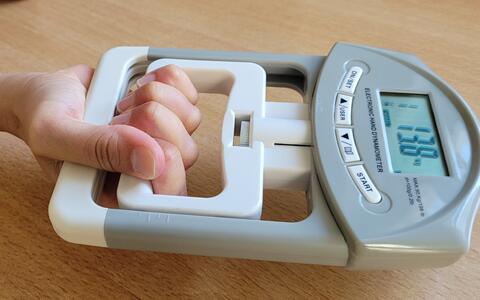The long-term course of severe long COVID
Patients who still have health problems three months after a SARS-CoV-2 infection, with symptoms ongoing for at least two months and no other explanation for these issues, are said to have post-COVID syndrome (PCS). Symptoms vary widely. Many people have problems with breathing, trouble concentrating, or little to no stamina. Many patients complain of fatigue that barely improves with normal rest and recovery. In many cases, these people struggle to cope with daily life, and even slight exertion exacerbates their condition (exertion intolerance). This situation is significantly more common in women than men.
But how long will these symptoms persist? According to findings for the initial few months following infection, recovery generally takes longer the more severe the initial infection was. Many people – but not all – see symptoms improve within a year. The long-term progression of the illness in these patients has been unclear so far.
For the new study in “eClinicalMedicine”, the researchers of Charité – Universitätsmedizin Berlin and Max Delbrück Center focused on people who still suffer from severe fatigue and exertion intolerance six months after contracting SARS-CoV-2. This study involved a comprehensive medical examination on the 106 participants – most of them women – at three points in time at several-month intervals.
“Unfortunately, our data show that people with post-COVID syndrome who have severe fatigue are still ill more than a year and a half after the initial infection,” says Dr. Judith Bellmann-Strobl, the study’s last author and a senior physician with the Neuroimmunology Outpatient Clinic at the Experimental and Clinical Research Center (ECRC), a joint institution of Charité and the Max Delbrück Center. “Only half of them – the half that do not present with the full range of symptoms of ME/CFS – experience gradual improvement in at least some symptoms.”
Two groups of PCS patients
Researchers had observed in 2022 that long COVID sufferers with severe fatigue and exertion intolerance fall within two groups. Some of the patients meet the diagnostic criteria for ME/CFS, a complex neuroimmunological disease with the key symptoms of severe fatigue, exertion intolerance and post-exertional aggravation of symptoms that can lead to physical disability. Patients in the second group experience similar symptoms, but their post-exertion symptoms are generally milder and do not last as long.
ME/CFS is characterized by weakness and/or excessive muscle weakness following activity. This device enables researchers to measure grip strength.
The new study shows that the latter group experiences some improvement over time, not only in fatigue, but also in terms of general malaise, pain, and concentration problems. These people’s functional ability often improved, and some were able to return to work. By contrast, post-COVID patients with ME/CFS saw barely any change in their symptoms. There were very few exceptions. “Seven of the 55 patients with ME/CFS experienced improvement in their physical impairments,” Bellmann-Strobl explains. “But we still don’t have an explanation for this, and we haven’t been able to identify any medical commonalities.”
Another observation may be useful going forward in gauging how post-COVID syndrome will progress in people who meet the diagnostic criteria for ME/CFS: “Grip strength was not only a parameter for how severe the disease was to start with, but also a predictor of how ME/CFS would progress,” explains Professor Carmen Scheibenbogen, Acting Director of the Institute of Medical Immunology at Charité and the head of the Charité Fatigue Center. She and Bellmann-Strobl were the principal investigators in the study. “Before we can use grip strength as a prognostic factor, though, we need further studies to confirm how meaningful it is.”
Avoiding overexertion
Even before the pandemic, there were an estimated three million people with ME/CFS in Europe, and the data we now have suggest that there are now twice that number due to the pandemic. “Our study shows that most people with ME/CFS remain severely ill,” Scheibenbogen says. “In addition to ramping up our efforts to find effective therapies, this means we also need to quickly establish healthcare facilities where patients can receive multidisciplinary care based on current scientific findings and clinical experience.”
Bellmann-Strobl’s main recommendation for patients is to pace themselves so they do not to overexert themselves. Fitness trackers or pedometers, heart rate monitors, activity journals, and relaxation exercises can help with that. “Pacing can prevent a worsening of the person’s condition. People should be very careful in feeling out their limits in terms of exertion. Professional guidance can help to prevent overexertion.”
Text: Charité
Further information
- Out-patient Clinic for Neuroimmunology
- SARS-CoV-2 can trigger chronic fatigue syndrome
- Informationen zum Pacing und weiteren Behandlungsmöglichkeiten auf der Webseite des Charité Fatigue Centrums
- Experimental and Clinical Research Center (ECRC)
- Institute of Medical Immunology of the Charité Berlin
Literature
Franziska Legler, Lil Meyer-Arndt et al. (2023): „Long-term symptom severity and clinical biomarkers in post-COVID-19/chronic fatigue syndrome: results from a prospective observational cohort“. eClinicalMedicine. DOI: 10.1016/j.eclinm.2023.102146
Contact
Dr. Judith Bellmann-Strobl
Experimental and Clinical Research Center (ECRC)
Charité – Universitätsmedizin Berlin and Max Delbrück Center
+49 30 450 570 400
judith.bellmann-strobl@charite.de
- Experimental and Clinical Research Center (ECRC)
As a joint institution of the Max Delbrück Center and Charité, the Experimental and Clinical Research Center fosters collaboration between basic scientists and clinical researchers. New approaches for diagnosis, prevention and therapy of cardiovascular and metabolic diseases, cancer and neurological diseases are developed and applied to patients in a timely manner. The Clinical Neuroimmunology Lab, headed by Professor Friedemann Paul, investigates the causes and therapies of autoimmune neuroinflammatory diseases such as multiple sclerosis.







